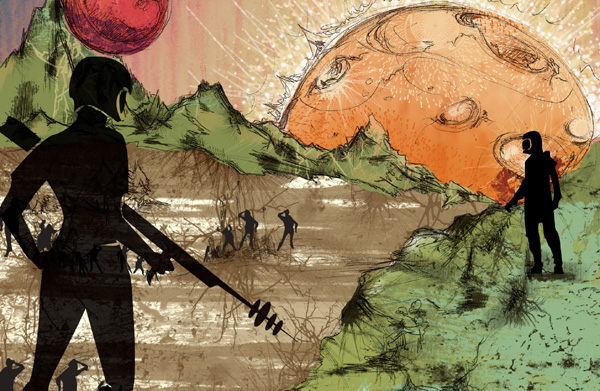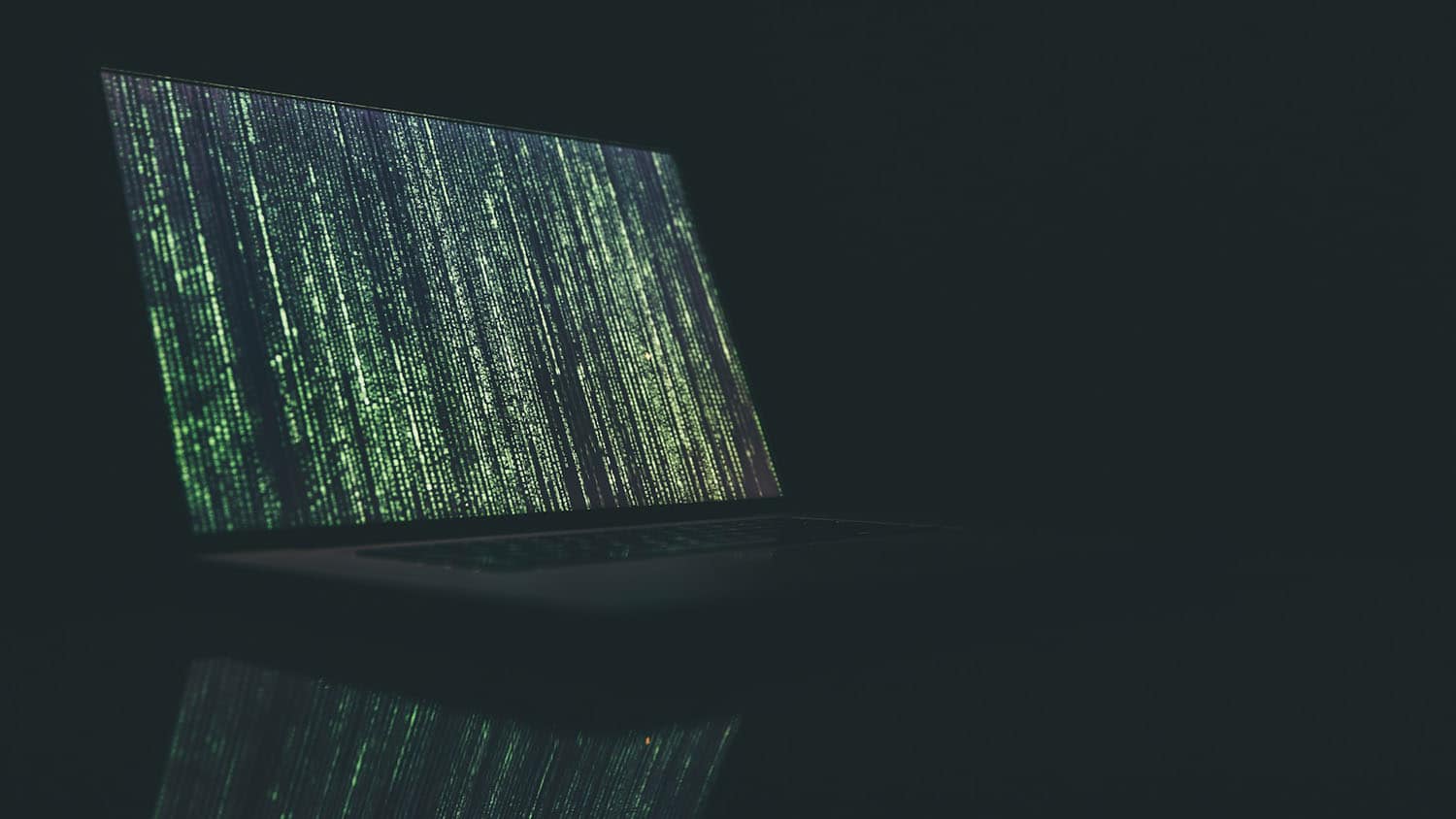Events Preceding the Helvetican Renaissance (Part II)

Editor’s Note: Readers of The Abstract are generally interested in research, science and technology. People that fall into that camp are often also devotees of science fiction. So, in a throw back to the serialized storytelling of the golden age of sci-fi, we decided to serialize some science fiction by one of our favorite authors – John Kessel. Kessel is a two-time Nebula award winner and a professor of English at NC State. New installments will come out every week for five weeks. The first installment can be found here. “Events Preceding the Helvetican Renaissance” is copyright 2009 by John Kessel. Enjoy!
I awoke battered, bruised, and exhausted in the pilot’s chair. The smell of my burned shoulder reminded me of the steak I had eaten in the port bazaar. The stress of accelerating nerve impulses had left every joint in my body aching. My arms were blue with contusions, and I was as enfeebled as an old man.
The screens showed me to be in an untraveled quarter of the system’s cometary cloud; my ship had cloaked itself in ice so that on any detector I would simply be another bit of debris among billions. I dragged myself from the chair and down to the galley, where I warmed some broth and gave myself an injection of cellular repair mites. Then I fell into my bunk and slept.
My second waking was relatively free of pain. I recharged my tooth and ate again. I kneeled before the shrine and bowed my head in prayer, letting peace flow down my spine and relax all the muscles of my back. I listened for the voices of the gods.
I was reared by my mother on Bembo. My mother was an extraordinary beautiful girl. One day Akvan, looking down on her, was so moved by lust that he took the form of a vagabond and raped her by the side of the road. Nine months later I was born.
The goddess Sedna became so jealous that she laid a curse on my mother, who turned into a lawyer. And so we moved to Helvetica. There, in the shabby city of Urushana, in the waterfront district along the river, she took up her practice, defending criminals and earning a little baksheesh greasing the relations between the Imperial Caslonian government and the corrupt local officials. Mother’s ambition for me was to go to an off-planet university, but for me the work of a student was like pushing a very large rock up a very steep hill. I got into fights; I pursued women of questionable virtue. Having exhausted my prospects in the city, I entered the native constabulary, where I was re-engineered for accelerated combat. But my propensity for violence saw me cashiered out of the service within six months. Hoping to get a grip on my passions, I made the pilgrimage to the monastery of the Pujmanian Order. There I petitioned for admission as a novice, and, to my great surprise, was accepted.
It was no doubt the work of Master Darius, who took an interest in me from my first days on the plateau. Perhaps it was my divine heritage, which had placed those voices in my head. Perhaps it was my checkered career to that date. The Master taught me to distinguish between those impulses that were the work of my savage nature, and those that were the voices of the gods. He taught me to identify the individual gods. It is not an easy path. I fasted, I worked in the gardens, I practiced the martial arts, I cleaned the cesspool, I sewed new clothes and mended old, I tended the orchards. I became an expert tailor, and sewed many of the finest kosodes worn by the masters on feast days. In addition, Master Darius held special sessions with me, putting me into a trance during which, I was later told by my fellow novices, I continued to act normally for days, only to awake with no memories of my actions.
And so I was sent on my mission. Because I had learned how not to think, I could not be detected by the spirits who guarded the Imperial Archives.
Five plays, immensely old, collectively titled The Abandonment, are all that document the rebirth of humanity after its long extinction. The foundational cycle consists of The Archer’s Fall, Stochik’s Revenge, The Burning Tree, Close the Senses, Shut the Doors, and the mystical fifth, The Magic Tortoise. No one knows who wrote them. It is believed they were composed within the first thirty years after the human race was recreated by the gods. Besides being the most revered cultural artifacts of humanity, these plays are also the sacred texts of the universal religion, and claimed as the fundamental political documents by all planetary governments. They are preserved only in a single copy. No recording has ever been made of their performance. The actors chosen to present the plays in the foundational festivals on all the worlds do not study and learn them; through a process similar to the one Master Darius taught me to confuse the spirits, the actors become the characters. Once the performance is done, it passes from their minds.
These foundational plays, of inestimable value, existed now only in my mind. I had destroyed the crystal containing them in the archives. Without these plays, the heart of Caslon had been ripped away. If the populace knew of their loss, there would be despair and riot.
And once Master Darius announced that the Order held the only copy in our possession, it would only be a matter of time before the Empire would be obliged to free our world.
Three days after my escape from Caslon, I set course for Helvetica. Using an evanescent wormhole, I would emerge within the planet’s inner ring. The ship, still encased in ice, would look like one of the fragments that formed the ring. From there I would reconnoiter, find my opportunity to leave orbit, and land. But because the ring stood far down in the gravitation well of the planet, it was a tricky maneuver.
Too tricky. Upon emergence in the Helvetican ring, my ship collided with one of the few nickel-iron meteoroids in the belt, disabling my engines. Within twenty minutes, Caslonian hunter-killers grappled with the hull. My one advantage was that by now they knew that I possessed the plays, and therefore they could not afford to blast me out of the sky. I could kill them, but they could not harm me. But I had no doubt that once they caught me, they would rip my mind to shreds seeking the plays.
I had only minutes—the hull door would not hold long. I abandoned the control room and retreated to the engine compartment. The place was a mess, barely holding pressure after the meteoroid collision, oxygen cylinders scattered about and the air acrid with the scent of burned wiring. I opened the cat’s closet, three meters tall and two wide. From a locker I yanked two piezofiber suits. I turned them on, checked their readouts—they were fully charged—and threw them into the closet. It was cramped in there with tools and boxes of supplies. Sitting on one of the crates, I pulled up my shirt, exposing my bruised ribs. The aluminum light of the closet turned my skin sickly white. Using a microtome, I cut an incision in my belly below my lowest rib. There was little blood. I reached into the cut, found the nine-dimensional pouch, and drew it out between my index and middle fingers. I sprayed false skin over the wound. As I did, the artificial gravity cut off, and the lights went out.
I slipped on my night vision eyelids, read the directions on the pouch, ripped it open, removed the soldier and unfolded it. The body expanded, became fully three dimensional, and, in a minute, was floating naked before me. My first surprise: it was a woman. Dark skinned, slender, her body was very beautiful. I leaned over her, covered her mouth with mine, and blew air into her lungs. She jerked convulsively and drew a shuddering breath, then stopped. Her eyelids fluttered, then opened.
“Wake up!” I said, drawing on my piezosuit. I slipped the force blade into the boot, strapped on the belt with blaster and supplies, shrugged into the backpack. “Put on this suit! No time to waste.”
She took in my face, the surroundings. From beyond the locker door I heard the sounds of the commandos entering the engine room.
“I am Brother Adlan,” I whispered urgently. “You are a soldier of the Republican Guard?” As I spoke I helped her into the skinsuit.
“Lieutenant Nahid Esfandiar. What’s happening?”
“We are in orbit over Helvetica, under attack by Caslonian commandos. We need to break out of here.”
“What weapons have we?”
I handed her a blaster. “They will have accelerated perceptions. Can you speed yours?”
Her glance passed over me, measuring me for a fool. “Done already.” She sealed her suit and flipped down the faceplate on her helmet.
I did not pay attention to her, because as she spoke, all-seeing Liu-Bei spoke to me. Three men beyond this door. In my mind I saw the engine room, and the three soldiers who were preparing to rip open the closet.
I touched my helmet to hers and whispered to Nahid, “There are three of them outside. The leader is directly across from the door. He has a common blaster, on stun. To the immediate right, a meter away, one of the commandos has a pulse rifle. The third, about to set the charge, has a pneumatic projector, probably with sleep gas. When they blow the door, I’ll go high, you low. Three meters to the cross corridor, down one level and across starboard to the escape pod.”
Just then, the door to the closet was ripped open, and through it came a blast of sleep gas. But we were locked into our suits, helmets sealed. Our blaster beams, pink in the darkness, crossed as they emerged from the gloom of the closet. We dove through the doorway in zero-G, bouncing off the bulkheads, blasters flaring. The commandos were just where the gods had told me they would be. I cut down one before we even cleared the doorway. Though they moved as quickly as we did, they were trying not to kill me, and the fact that there were two of us now took them by surprise.
Nahid fired past my ear, taking out another. We ducked through the hatch and up the companionway. Two more commandos came from the control room at the end of the corridor; I was able to slice one of them before he could fire, but the other’s stunner numbed my thigh. Nahid torched his head and grabbed me by the arm, hurling me around the corner into the cross passageway.
Two more commandos guarded the hatchway to the escape pod. Nahid fired at them, killing one and wounding the other in a single shot. But instead of heading for the pod she jerked me the other way, toward the umbilical to the Caslonian ship.
“What are you doing?” I protested.
“Shut up,” she said. “They can hear us.” Halfway across the umbilical, Nahid stopped, braced herself against one wall, raised her blaster, and, without hesitation, blew a hole in the wall opposite. The air rushed out. A klaxon sounded the pressure breach, another commando appeared at the junction of the umbilical and the Caslonian ship—I burned him down—and we slipped through the gap into the space between the two ships. She grabbed my arm and pulled me around the hull of my own vessel.
I realized what she intended. Grabbing chunks of ice, we pulled ourselves over the horizon of my ship until we reached the outside hatch of the escape pod. I punched in the access code. We entered the pod and while Nahid sealed the hatch, I powered up and blasted us free of the ship before we had even buckled in.
The pod shot toward the upper atmosphere. The commandos guarding the inner hatch were ejected into the vacuum behind us. Retro fire slammed us into our seats. I caught a glimpse of bodies floating in the chaos we’d left behind before proton beams lanced out from the Caslonian raider, clipping the pod and sending us into a spin.
“You couldn’t manage this without me?” Nahid asked.
“No sarcasm, please.” I fought to steady the pod so the heat shields were oriented for atmosphere entry.
We hit the upper atmosphere. For twenty minutes we were buffeted by the jet stream, and it got hot in the tiny capsule. I became very aware of Nahid’s scent, sweat and a trace of rosewater; she must have put on perfume before she was folded into the packet that had been implanted in me. Her eyes moved slowly over the interior of the pod.
“What is the date?” she asked.
“The nineteenth of Cunegonda,” I told her. The pod bounced violently and drops of sweat flew from my forehead. Three red lights flared on the board, but I could do nothing about them.
“What year?”
I saw that it would not be possible to keep many truths from her. “You have been suspended in nine-space for sixty years.”
The pod lurched again, a piece of the ablative shield tearing away. She sat motionless, taking in the loss of her entire life.
A snatch of verse came to my lips, unbidden: “Our life is but a trifle/ A child’s toy abandoned by the road/ When we are called home.”
“Very poetic,” she said. “Are we going to ride this pod all the way down? They probably have us on locator from orbit, and will vaporize it the minute it hits. I’d rather not be called home just now.”
“We’ll eject at ten kilometers. Here’s your chute.”
When the heat of the re-entry had abated and we hit the troposphere, we blew the explosive bolts and shot free of the tumbling pod. Despite the thin air of the upper atmosphere, I was buffeted almost insensible, spinning like a prayer wheel. I lost sight of Nahid.
I fell for a long time, but eventually managed to stabilize myself spread-eagled, dizzy, my stomach lurching. Below, the Jacobin Range stretched north to southwest under the rising sun, the snow-covered rock on the upper reaches folded like a discarded robe, and below the thick forest climbing up to the tree line.
Some minutes later, I witnessed the impressive flare of the pod striking just below the summit of one of the peaks, tearing a gash in the ice cover and sending up a plume of black smoke that was torn away by the wind. I tongued the trigger in my helmet, and with a nasty jerk, the airfoil chute deployed from my backpack. I could see Nahid’s red chute some five hundred meters below me; I steered toward her hoping we could land near each other. The forested mountainside came up fast. I spotted a clearing on a ledge two thirds of the way up the slope and made for it, but my burned shoulder wasn’t working right, and I was coming in too fast. I caught a glimpse of Nahid’s foil in the mountain scar ahead, but I wasn’t going to reach her.
At the last minute, I pulled up and skimmed the tree tops, caught a boot against a top limb, flipped head over heels and crashed into the foliage, coming to rest hanging upside down from the tree canopy. The suit’s rigidity kept me from breaking any bones, but it took me ten minutes to release the shrouds. I turned down the suit’s inflex and took off my helmet to better see what I was doing. When I did, the limb supporting me broke, and I fell the last ten meters through the trees, hitting another limb on the way down, knocking me out.
- Categories:


